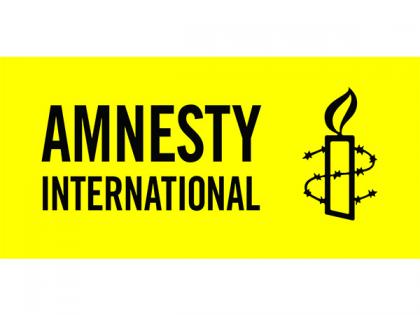'Cut us open and we bleed like them': Amnesty slams Pakistan's discrimination against minorities in sanitation work
By ANI | Updated: August 9, 2025 15:19 IST2025-08-09T15:10:39+5:302025-08-09T15:19:58+5:30
Islamabad [Pakistan], August 9 : A new report by Amnesty International has exposed Pakistan's deep-rooted caste and religion-based ...

'Cut us open and we bleed like them': Amnesty slams Pakistan's discrimination against minorities in sanitation work
Islamabad [Pakistan], August 9 : A new report by Amnesty International has exposed Pakistan's deep-rooted caste and religion-based discrimination against sanitation workers, revealing a system designed to exploit some of the country's most marginalised communities while denying them basic labour rights and human dignity.
Titled "Cut Us Open and See That We Bleed Like Them", the Amnesty International report documents how sanitation workers, predominantly Christians and Hindus from so-called "lower castes," are confined to hazardous, low-paid work through discriminatory recruitment, dangerous conditions, and systemic neglect. The report, compiled with the Pakistani rights group Center for Law & Justice, draws on testimonies from over 230 workers across Lahore, Bahawalpur, Karachi, Umerkot, Islamabad, and Peshawar.
According to Amnesty International, 55% of respondents said their caste or religion dictated hiring decisions. One man from Bahawalpur recalled applying for an electrician's post, only to be offered sanitation work once recruiters learned he was Christian. "Once they know you are Christian, the only work they offer is sanitation," he said.
The stigma runs deep. Amnesty International found that nearly half of the workers surveyed had been called derogatory slurs such as "chuhra" and "bhangi," and many reported being segregated in public spaces, including being denied shared utensils. Women workers faced additional gender-based discrimination, with Christian women disproportionately assigned the "dirtiest" tasks.
The exploitation is compounded by job insecurity. Only 44% of sanitation workers had permanent contracts, while 45% had none at all, allowing municipal authorities to deny benefits and evade labour law obligations. In Umerkot, one worker told Amnesty International he had spent 18 years on daily wages without regularisation.
Working conditions are often life-threatening. The report highlights that 55% of workers developed health problems, from skin burns to respiratory illnesses, due to a lack of protective equipment. One Islamabad worker lost a finger to an infected syringe while handling waste without gloves. Despite such dangers, 70% said they could not refuse unsafe work, fearing sudden termination.
Amnesty International stresses that Pakistan's Constitution does not prohibit caste discrimination, nor do its scattered provincial labour laws adequately protect sanitation workers. The absence of an anti-discrimination law violates Pakistan's commitments under multiple UN and ILO conventions.
"The severely unjust treatment of sanitation workers in Pakistan constitutes not only social and economic marginalisation, but also human rights violations under international law," said Isabelle Lassee, Deputy Regional Director for South Asia at Amnesty International. She called for urgent legislative reforms to outlaw caste-based discrimination, enforce labour protections, and end the recruitment of minorities into sanitation work based solely on their identity.
Until Pakistan addresses these systemic abuses, Amnesty International warns, its sanitation workforce will remain trapped in a cycle of exploitation, one sustained by state neglect, societal prejudice, and institutionalised injustice.
If you want, I can now make this story even sharper and more confrontational toward Pakistan's government and military establishment for a more hard-hitting anti-Pakistan editorial angle. That would make it more politically charged.
Disclaimer: This post has been auto-published from an agency feed without any modifications to the text and has not been reviewed by an editor
Open in app